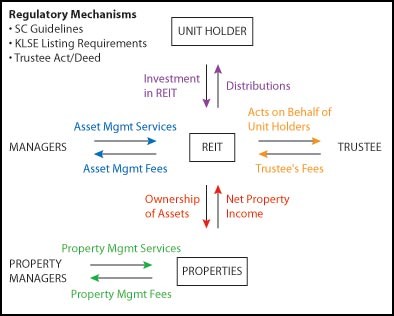Real estate investment trust
Post on: 8 Апрель, 2015 No Comment

Real estate investment trusts were created from a law that Congress enacted in 1960 [note 1] to enable small investors to invest in real estate without either the large capital required to purchase single properties, or the responsibilities of property maintenance on a direct realty purchase. When holding shares of an equity REIT, an investor is an actual owner of the underlying real estate.
REITs receive special tax treatment—the deduction of dividend payments on their corporate income taxes— as long as the primary purpose of the company is to own real estate and it pays out 90% of its dividend income (rental income or mortgage interest) each year to shareholders. The special tax treatment REIT dividends receive means that they are deemed non-qualified dividends for the investor (ie. not subject to the lower qualified dividend tax rate granted to firms subject to double taxation). This makes REITs very tax-inefficient, and best held in tax-deferred accounts. [note 2]
If an investor has filled up available tax-advantaged space with bonds and wants to invest in REITs, placing them in a low-cost variable annuity or a non-deductible traditional IRA is usually more tax efficient than holding them in a taxable account. Alternately, an investor can also switch taxable bonds held in tax-advantaged accounts for REIT held in tax-advantaged and adding municipal bonds held in taxable accounts.
Contents
Types of REITs
REITs are typically characterized by the nature of the assets the company holds: real estate, mortgages, or a combination of the two.
- Equity REITs. own physical real estate and are traded on a public stock exchange. This makes REITs very liquid unlike owning real estate on your own. Equity REITS make up over 80% of the U.S. REIT market, [1] and include the following sectors:
- Diversified REITs: own a diverse group of properties not tied to any specific sector or industry.
- Industrial REITs: own industrial real estate, ie. used for industry manufacturing.
- Office REITs: REITs that own office buildings or other similar property.
- Residential REITs: REITs that invest in residential real estate, such as apartment complexes.
- Retail REITs: REITs that invest primarily in retail properties such as shopping malls.
- Specialized REITs: own property that is specialized in a single use (such as lodging or storage).
- Mortgage REITs. Invest primarily in mortgages backed by commercial real estate, and the earnings are from the mortgage loans. [note 3]
- Hybrid REITs. REITs that invest in both property ownership and mortgages.
- Private REITs. Private (non-traded) REITs are not traded on a public stock exchange, and are very illiquid. These are often sold by financial advisors who receive large commissions, an indication that they are not looking out for your best interest, and are designed to be sold and not bought. [2]
Composition of MSCI REIT index
Below is a table of a percentage breakdown of the different types of REITs in the MSCI REIT Index [3].














